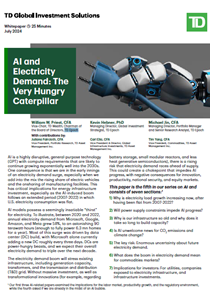AI is a transformative technology with rapidly growing compute requirements that will significantly impact electricity demand well into the 2030s. This surge in demand, coupled with the increasing use of electric vehicles and the onshoring of manufacturing, will strain energy infrastructure, which has remained static from 2007 to 2022.
AI models’ immense need for electricity is evident from the 58% increase in demand by tech giants like Microsoft, Google, Amazon, and Meta between 2020 and 2022, primarily due to data center expansions. As data centers are major electricity consumers, their demand is expected to triple in the next decade, stressing generation capacity, transformers, and the T&D grid.
Without substantial investment and innovations in battery storage, small modular reactors, and efficient semiconductors, the electricity supply may lag behind demand, hindering AI progress and affecting innovation, productivity, national security, and equity markets.
This paper explores these challenges and their implications for energy infrastructure and investment.
Download the full paper
